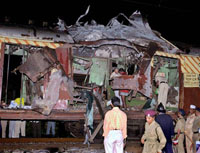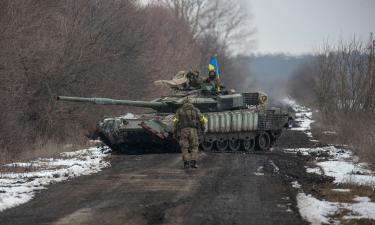Analyzing Indian blasts
Two hundred innocent men, women and children have died, scores orphaned and widowed and another 700 persons maimed, mutilated and amputated in the seven serial blasts that shook India’s financial hub Mumbai on a black Tuesday, a price it pays for dismissing such attacks solely as an imported menace. These crimes against humanity have occurred in the past several times in Mumbai itself, the worst attack coming in the December of 1993, killing 257 people and destroying property worth millions of rupees. This and several other macabre acts of sabotage involved local authors too.

They were followed by attacks on temples in Akshardham (Gujarat), Jammu, Hyderabad, and Varanasi. The most shocking assault was on Indian Parliament in December 2001. Add this to the daily Jihad massacre of civilians, pilgrims and army personnel in Kashmir to get a picture of the collapse of vigil. Terming the serial blasts in Mumbai and Jammu and Kashmir as a "monstrous crime", Russian President Vladimir Putin has said the terrorists responsible for the attacks must be severely punished. Nearly every country in the world joined in the condemnation of these crimes against humanity. Countries like the United States, Britain and Russia which have been victims of terrorism took and are taking whatever measures are necessary to crush terrorism.
Although no militant outfit has claimed responsibility for the outrage, officials suspect two Islamic terrorist groups that have been active in Kashmir -- Lashkar-e-Toeba and Jaish-e-Mohammed. Jaish-e-Mohammed claimed responsibility for the beheading of U.S. journalist Daniel Pearl. Indian governments seem to be comfortable with regarding these assaults as the work of groups based in Pakistan/Kashmir. The Times of India says as much, “The sophistication of explosives used and coordinated nature of the attacks point to Kashmir-linked terrorist groups, a connection that's strengthened by simultaneous grenade attacks that took place on tourists in Srinagar.” The result of such an approach is to rule out the role of home-grown modules. Both the government of Manmohan Singh and the people know that attacks cannot be mounted without local support.
Every time a blast goes off and people are killed the reaction is predictable: blame Pakistan or some outside outfit, announce compensation for relatives of the dead, order an inquiry, ask people to maintain peace and worst of all discount domestic realities. In the last 58 years, many political parties have overlooked anti-national activities for the sake of electoral gains. The first thing Manmohan Singh government did was to repeal a law called Prevention of Terrorism Act and create an environment conducive to terrorism.
The strangest reading of these ghastly crimes came from the so-called liberal newspaper Guardian. In an editorial it said, “Terrorist attacks in India in recent years have been the work of Hindu and Muslim extremists. Kashmiri groups are nevertheless likely to be in the frame, a view which will be bolstered by a grenade attack earlier yesterday in Srinagar, and reports of a non-specific intelligence alert of an impending operation.” This is as farcical as saying that the British nationalists are responsible for the 7/7 bombings.
In both Kashmir and in some north-eastern states, Indian defence forces are fighting insurgency and secessionism by local groups. This punches a big hole in India’s revenue base. The Tribune, one of India’s most respected dailies says, “The scale at which the strikes were organized suggests that it is the handiwork of a major terrorist outfit with considerable resources of men and material. The needle of suspicion invariably turns to Pakistan from where men and material have been flowing into this country to create violence.” It is suicidal to believe that outsiders did it without help from insiders. This kind of reductive logic helps several communal outfits in the country not only to flourish but penetrate politics and intelligence.
The Economic Times too says the same thing. “However, the synchronized nature of the explosions is similar to the Delhi blasts last year and a series of such events in Mumbai over the past few years, including the simultaneous blasts at the Gateway of India and Crawford Market in 2004, all of which seem to have been perpetrated by Pakistan-based Jihad groups. And India once again needs to impress upon the global community of the need to persuade Pakistan to dismantle its infrastructure of terror.”
Security officials confirmed that Tuesday’s blasts must have involved more than 25 people who might have knowingly and unknowingly participated. It is very likely that the masterminds are not in India. The actual perpetrators may not be more than four or five but these guys must have got help from many people. The infrastructure for these blasts must have been quite big. Motor vehicles, local agents, people who provided cover to terrorists and people who planted the devices must have been involved. They should be and will be found out, the officials said.
Many foreign media have suggested strengthening of Indo-Pak detente. That sounds logical But see what the Washington Post says, “But -- and here's the crux of the matter -- how long can India, Indians and the Singh government withstand the constant pressure from militant groups before they have to react? Compare their restraint with Israel's response to the kidnapping of its soldier or to the U.S. and Japanese responses to North Korea's missile tests. A good -- or at least stable -- India-Pakistan relationship is one of the most important elements for long-term global stability. In return, India would need to step up in a real, substantive way on bilateral issues such as Kashmir.”
Several experts in media and outside see co-ordination between local saboteurs and outside outfits. The BBC strengthens this theory. It says, “Two of the previous attacks were said to have carried out by Islamic militants, allegedly at the behest of Mumbai's criminal underworld.” Director-General of Police of Maharashtra P S Pasricha told media persons in Mumbai that political figures in Maharashtra are under police scanner for 'suspicious' activities and action would be taken against them at an appropriate time.
It is difficult to agree with the thesis that India has become the prime target of terrorists because it is a rising power and a nation becoming a bulwark of democracy and stability in Asia. The real reason is, as the Times, London, put it, “Not only do the jihadists and obscurantist extremists see Hinduism, like Christianity and Buddhism, standing in the way of global Islamist dominance; but for militants in Pakistan and beyond, Kashmir has long been the cause to rally the Muslim masses to the cause of embattled fanaticism.” Many of the policies that the Manmohan Singh government is following, that embolden extremists, flow from political compulsions like protecting the party’s electoral base from erosion. Innocent people are paying the price for such aberrations.
Dasu Krishnamoorty
Pravda.Ru
Discuss this article on Pravda.Ru English Forum
Subscribe to Pravda.Ru Telegram channel, Facebook, RSS!




